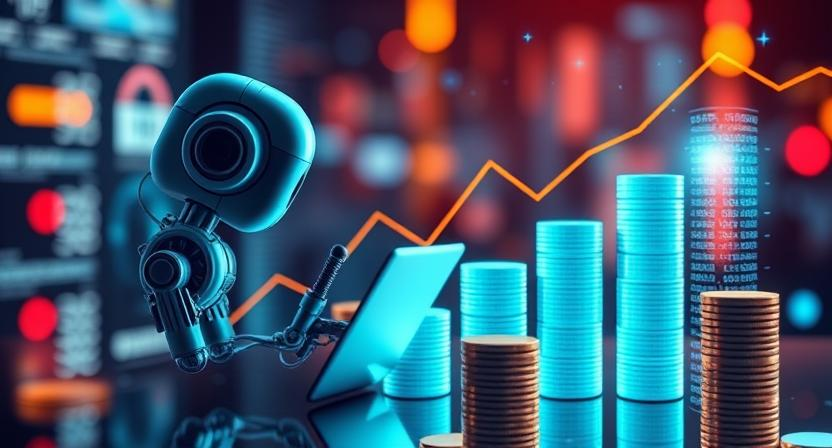
AI in Market Research: Gaining Competitive Advantage
April 2, 2025
AI-Powered Marketing Insights: How to Leverage Analytics
April 3, 2025In the competitive landscape of digital marketing, companies constantly seek ways to maximize their return on investment (ROI). Artificial Intelligence (AI) has revolutionized marketing strategies by enabling data-driven decision-making, optimizing ad spending, and enhancing customer engagement. AI-powered tools help marketers allocate their budgets more efficiently, ensuring that every dollar spent contributes to higher conversions and improved revenue. This article explores how AI optimizes marketing budgets, ultimately leading to better ROI.
Understanding AI in Marketing
AI in marketing refers to the use of machine learning, natural language processing (NLP), automation, and predictive analytics to analyze consumer behavior and optimize marketing efforts. AI-driven tools help businesses make real-time decisions, reduce manual workload, and personalize marketing campaigns at scale. Popular AI technologies include chatbots, AI-powered ad bidding, recommendation engines, and automated content generation.
The Role of AI in Budget Optimization
AI enhances budget allocation by analyzing vast datasets to determine the most effective marketing channels. Key functions include:
- Data-driven decision-making: AI evaluates historical data to allocate budgets to the highest-performing campaigns.
- Real-time performance tracking: AI continuously monitors ad performance and adjusts spending dynamically.
- Automation of repetitive tasks: AI reduces manual work by automating ad placements, bidding, and audience segmentation.
AI-Driven Audience Targeting
One of AI’s most significant advantages is its ability to target the right audience with precision. AI-driven tools enable:
- Customer segmentation: AI categorizes audiences based on demographics, interests, and behaviors.
- Predictive analytics: AI forecasts user behavior, helping businesses engage potential customers before they convert.
- Personalization at scale: AI delivers personalized messages, product recommendations, and ads to enhance engagement.

Enhancing Ad Campaigns with AI
AI improves ad campaigns by optimizing bidding, testing creatives, and automating placements:
- AI-powered bidding: AI automatically adjusts ad bids based on real-time performance.
- A/B testing: AI runs multiple ad variations to determine the most effective creative.
- Dynamic creative optimization (DCO): AI customizes ads based on audience preferences and engagement patterns.

AI in Content Marketing Optimization
Content marketing benefits significantly from AI-driven insights:
- AI-generated content: AI tools like ChatGPT assist in creating engaging blog posts, product descriptions, and social media content.
- SEO enhancement: AI-driven keyword research and content recommendations improve organic rankings.
- Sentiment analysis: AI assesses audience sentiment to refine content strategies.

Chatbots and AI-Powered Customer Engagement
AI chatbots streamline customer service while reducing costs:
- Cost-efficient support: AI-powered chatbots handle inquiries without human intervention.
- Lead nurturing: AI engages potential leads through automated conversations.
- Personalized recommendations: AI-driven responses enhance the user experience by offering relevant product suggestions.

AI in Social Media Marketing
AI-driven tools optimize social media marketing strategies:
- Social listening: AI monitors brand mentions and audience sentiment in real time.
- Automated scheduling: AI schedules and posts content at optimal times for maximum engagement.
- Influencer marketing insights: AI analyzes influencer performance to maximize partnership ROI.

AI in Email Marketing
Email marketing becomes more effective with AI-driven automation:
- AI-powered segmentation: AI categorizes recipients based on behavior and preferences.
- Predictive subject line optimization: AI suggests high-converting subject lines.
- Automated follow-ups: AI schedules and personalizes follow-up emails to increase conversions.

AI-Powered Predictive Analytics for Marketing
AI predicts trends and identifies high-value customers, leading to smarter marketing decisions:
- Forecasting customer trends: AI analyzes market trends to adjust marketing strategies proactively.
- Identifying high-value leads: AI prioritizes leads with the highest likelihood of conversion.
- Reducing marketing waste: AI eliminates inefficient spending by identifying low-performing strategies.

AI in Conversion Rate Optimization (CRO)
AI optimizes conversion rates by refining user experiences:
- Landing page optimization: AI suggests design and content changes for better engagement.
- Heatmap analysis: AI tracks user behavior on websites to improve navigation and layout.
- Automated personalization: AI customizes web pages based on visitor preferences.

Fraud Detection and AI in Marketing Spend
AI protects marketing budgets by preventing fraud and waste:
- Ad fraud detection: AI identifies fake clicks and impressions to prevent wasted ad spend.
- Bot traffic prevention: AI filters out non-human traffic for accurate analytics.
- Budget efficiency: AI ensures marketing dollars are spent on real, engaged users.

AI in Influencer Marketing
AI enhances influencer marketing strategies:
- AI-based influencer discovery: AI identifies the most relevant influencers for a brand.
- Performance analysis: AI tracks influencer engagement and ROI.
- Fraud detection: AI detects fake followers and engagement to ensure authentic partnerships.

Challenges of AI in Marketing Budget Optimization
Despite its benefits, AI presents certain challenges:
- Data privacy concerns: AI relies on extensive data collection, raising ethical and compliance issues.
- AI biases: Algorithmic biases can impact targeting and ad delivery.
- Implementation barriers: High costs and technical expertise are required for AI adoption.

Future of AI in Marketing Budget Optimization
AI’s role in marketing will continue to evolve with new advancements:
- Hyper-personalization: AI will deliver even more personalized marketing experiences.
- Improved AI regulations: New policies will ensure ethical AI usage in marketing.
- AI-driven automation: More tasks will become automated, further optimizing budgets.
Conclusion
AI is transforming marketing by optimizing budgets, increasing efficiency, and enhancing customer engagement. With data-driven insights, businesses can make informed decisions that maximize their ROI. As AI technology continues to evolve, marketers must embrace AI-powered tools to stay competitive in an increasingly digital landscape.


